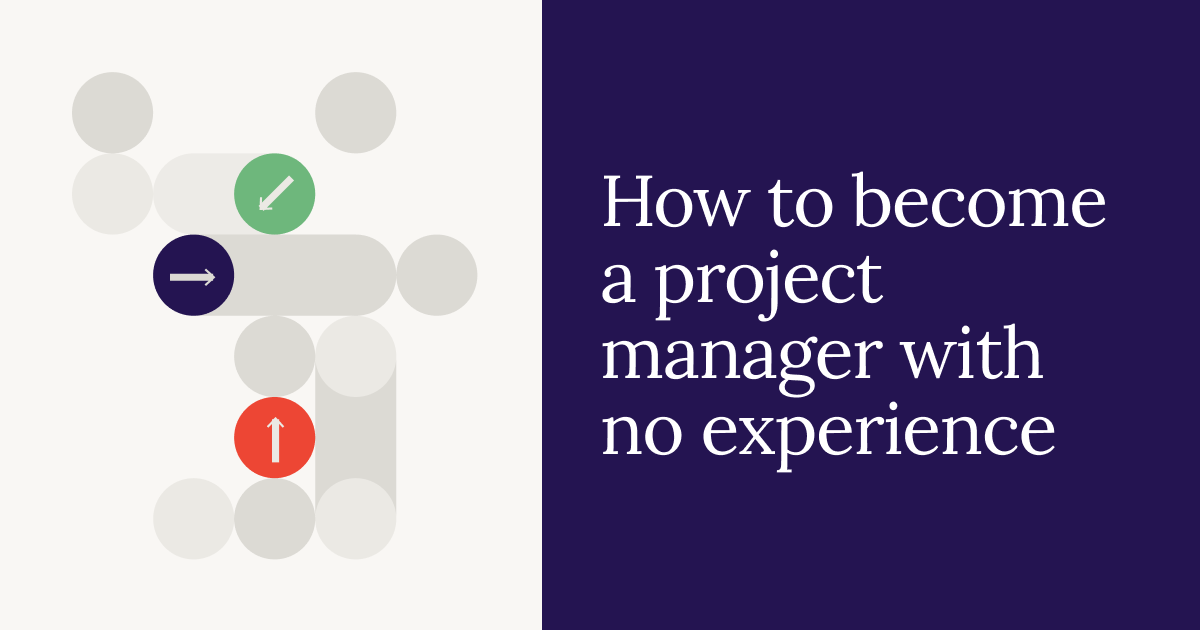
Think about the last project you worked on. Maybe you were working as part of a team — perhaps you were even the team leader. Or, maybe you handled everything independently. Whether it was a school project, a work project, or a home DIY project, you likely came up with a set of steps designed to achieve your predefined result. Along the way, you probably had to troubleshoot issues and communicate progress with others, like a supervisor, colleague, or family member.
During that time, you were practicing project management. The Project Management Institute (PMI) defines a project as a “series of structured tasks, activities, and deliverables that are carefully executed to achieve a desired outcome.” So, even if you haven’t formally held a project management position, you‘ve already gained valuable hands-on experience that applies directly to the role.
Project management is needed across nearly every industry, and with the rise of AI-driven tools, the role of a project manager (PM) has evolved to include data-driven decision-making and predictive analytics. From construction to software development, finance, advertising, and healthcare, industries are increasingly integrating AI to improve efficiency, track progress, and optimize resources. As a result, project managers today are expected to navigate traditional project management tasks and incorporate AI technologies into their workflows.
This article will provide you with a roadmap to help you transition into your first project management role. Whether you’re a recent graduate or a professional looking to shift industries, becoming a project manager from scratch is not only possible but also a rewarding career choice in a dynamic and rapidly evolving field.
What is project management?
Project management is the process of planning, organizing, and managing resources to ensure the successful completion of a particular project. A project is defined as a combination of set goals and objectives to be met within a specific time period.
A project manager is pivotal to a project’s success from start to finish. They coordinate with stakeholders, set timelines, monitor budgets, and oversee other critical factors associated with a project. Effective project managers are able to balance competing priorities and navigate the complexities of various projects.
Organizations with strong project management practices complete more projects on time and within budget, making project management skills essential across a wide range of industries. According to the U.S. Bureau of Labor Statistics (BLS), project management specialists are employed in fields such as construction, information technology, finance, and insurance. This highlights the importance of project management as a career choice and underscores the potential for growth and stability in this field.
With the growing reliance on AI tools, project managers also leverage these technologies to improve productivity and meet business goals efficiently. The future of project management is not only about overseeing tasks but also using AI to optimize decision-making processes, making project management an even more exciting and crucial field.
Assessing your skills and interests
Once you’ve decided to start learning project management skills, the first step is to assess your current abilities and strengths. On top of technical skills, project managers must possess critical soft skills that align with project management principles:
- Leadership: The ability to guide, motivate, and manage a team toward a common goal.
- Organizational skills: Keeping track of tasks, deadlines, and resources in a structured way.
- Time management: Prioritizing and allocating time efficiently to ensure projects are completed on schedule.
- Problem-solving skills: Addressing challenges and finding solutions quickly.
- Proactive thinking: Anticipating potential issues and taking action before they arise.
- Attention to detail: Ensuring all aspects of a project are thoroughly planned and executed without missing key elements.
- Project planning: Developing a comprehensive plan that outlines tasks, timelines, and resources.
- Strong communication skills: Ensuring clear and consistent communication with stakeholders, team members, and clients.
Don’t have professional experience? That’s okay. Many learners gain valuable, transferable skills through their education, part-time jobs, or extracurricular activities. For example, you may have held a leadership role in your school, captained a sports team, or coordinated a volunteer project. These all require skills that are relevant to a project management career.
AI and transferable skills
With the increasing integration of AI tools in project management, there’s an added layer to consider. AI-powered tools can help enhance communication, track project progress, and forecast potential risks, making it important for aspiring project managers to familiarize themselves with these technologies. However, the foundational skills—like leadership, organization, and communication—are still what drive successful project management, with AI serving as a complementary tool to make the process more efficient.
Exploring education and certification options
Becoming a project manager from scratch will depend on your experience level. Here’s a breakdown of recommended educational paths for learners at different career stages:
- For learners in college: New college students are in a great position to align their education with a future career in project management. Undergraduate programs in business administration, management, and industrial engineering can provide a strong foundation in relevant skills and knowledge, including project management methodologies.
- For learners with experience in a non-project management field: Professionals in a variety of industries are well-positioned to transition into project management. Online programs, like our Project Management Certificate Course, offer practical insights and hands-on experience that can complement your existing skills.
- For learners with extensive experience in a different field: A long career can be a valuable asset, especially for aspiring project managers who wish to remain in their field but pivot toward a PM role. A master’s program with a project management focus can provide the advanced knowledge you need to qualify for higher-level opportunities.
As an aspiring project manager, you may also be interested in exploring industry certifications offered through the PMI, such as:
- Certified Associate in Project Management (CAPM)®
- Project Management Professional (PMP)®
- PMI Construction Professional (PMI-CP)™
- PMI Agile Certified Practitioner (PMI-ACP)®
- PMO Certified Practitioner (PMO-CP)™
- Certified ScrumMaster (CSM)
- Lean Six Sigma
- PRINCE2
By tailoring your educational path and certifications to your current experience level, you can effectively prepare for a successful career in project management and enhance your job prospects in this dynamic field.
Gaining relevant project management experience
After obtaining project management skills, knowledge, and certifications, it’s important to put your education into practice. Internships and entry-level roles can provide a smooth transition into the field, which can be especially beneficial for PMs with little or no professional experience.
As you start browsing jobs, you may see a variety of titles listed. Common entry-level project manager roles include:
- Junior Project Manager
- Junior Project Leader
- Project Coordinator
- Assistant Project Manager
- Associate Project Manager
- Digital Project Manager
Junior project manager roles may be similar in nature; however, it’s important to remember that every organization has its own approach to project management. Some teams may prefer agile project management to handle complex projects, while others may take a waterfall or scrum approach. Be sure to familiarize yourself with various project management approaches to increase your marketability as a job applicant.
If you’re not ready to start applying for jobs, volunteer opportunities are another great way to build your project management experience. Look into community projects, local events, or nonprofit organizations that may need project management assistance. These experiences do more than strengthen your resume — they also help you develop essential project management skills.
Whether you choose to dive into the job search or prefer to ease into PM roles, it’s also important to seek out networking and mentorship opportunities wherever possible. Search LinkedIn, join professional groups, and seek out industry events to connect with professionals who can help you navigate your career path.
Getting comfortable with AI in project management:
Familiarizing yourself with AI-powered tools can enhance your efficiency and decision-making. For instance, platforms like Asana, Trello, and Jira offer AI features that automate project updates, task prioritization, and resource allocation, which are crucial for improving team productivity and managing timelines.
Here are some tips for integrating AI into your self-driven training:
- Practice using AI tools: Start experimenting with popular AI-powered project management platforms. Many offer free trials or entry-level accounts, allowing you to explore features like automated scheduling, task prioritization, and real-time performance tracking.
- AI training resources: Many project management courses and certifications now include components focused on AI integration. Platforms like Coursera, LinkedIn Learning, or even AI-specific courses can help you understand how to leverage AI tools effectively in project management.
- Stay updated on AI trends: Follow blogs, webinars, and articles related to AI in project management. Understanding emerging AI tools and their applications in project management can give you an edge when interviewing for roles.
If you’re not quite ready to start applying for full-time positions, volunteer opportunities are another excellent way to build experience. Many nonprofit organizations and community projects are in need of project management assistance, and volunteering can help you develop practical skills, including how to incorporate AI tools into managing tasks and resources.
Networking and mentorship are also invaluable for accelerating your career. Connect with other project management professionals through platforms like LinkedIn or by attending industry events. These connections can introduce you to new opportunities, give you insights into AI applications in project management, and help you refine your approach as you navigate your career path.
Integrating AI tools into your self-driven training and gaining hands-on experience through internships, volunteer opportunities, and networking will not only help you develop essential project management skills but also make you a competitive candidate in a rapidly evolving field. By leveraging AI effectively, you can elevate your project management abilities and stand out in the job market.
Developing key project management skills and abilities
Project managers possess a wide range of technical and interpersonal skills that enable them to perform key activities, including:
- Communicating with clients and stakeholders
- Developing project plans
- Identifying, vetting, and selecting outside contributors as needed
- Assigning tasks to project members
- Identifying and resolving problems that arise during the project
- Monitoring project costs, milestones, and deliverables
- Proposing modifications to project plans if necessary
- Producing and distributing project documents
PMs also use a variety of project management software, tools, and platforms to track project progress and monitor for roadblocks or opportunities. Many of them include built-in AI-powered features to automate routine tasks or identify project roadblocks and opportunities. Take a look at the table below to learn about the commonly available options:
Building your project management portfolio
When you start researching and applying for project management roles, you may notice requests for portfolios or work samples. These allow employers to see how you think through the project management process and assess your skill level with respect to the position.
As you build your portfolio, highlight various projects you worked on during your education, internships, or volunteer time, with clear documentation of your role, any challenges you encountered, and outcomes. You can feature your portfolio on a personal website, create a presentation to send to potential employers, or promote your work samples on LinkedIn or other networking websites.
Incorporating AI tools into your portfolio can also be a strategic way to demonstrate your understanding of the latest trends in project management. For example, if you’ve used AI-powered project management tools like Asana, Trello, or Wrike, you can mention how you leveraged these platforms to optimize workflows, track milestones, or predict project risks. Highlighting these technologies will show potential employers that you’re not only proficient in traditional project management skills but also well-versed in leveraging AI to improve efficiency and decision-making.
Here’s how you can present your portfolio:
- Personal website: Create an online portfolio to showcase detailed project case studies, work samples, and AI tool usage. Include project timelines, risk assessments, and predictive analytics insights (e.g., AI-driven forecasts) that highlight your ability to adapt and use modern tools.
- LinkedIn: Use LinkedIn’s “Featured” section to promote your project samples, articles on AI in project management, or any certifications you’ve earned. Highlight how you’ve used AI tools in your projects to add a tech-savvy edge to your profile.
- Presentation: Design a professional presentation that outlines your projects, roles, and AI integration in project management. Include concrete examples of how you used AI to overcome challenges or improve project outcomes.
By including AI-driven elements in your portfolio, you not only demonstrate technical expertise but also position yourself as a forward-thinking project manager who is ready to contribute to the future of the industry.
Landing your first project management role
After you obtain a project management education, earn relevant certifications, and build your project portfolio, you’re ready to start applying for project management jobs. Take note of the skills required for each role and tailor your resume and cover letter to highlight your relevant abilities.
This is also the time to leverage your industry connections. Check in with project managers and other professionals who can introduce you to hiring managers or refer you for open positions within their organizations.
When it’s time for the interview, don’t panic! Wear a confidence-boosting outfit, walk in with your head high, and stay professional in your communication. Prepare for interviews by practicing your answers to common questions, such as:
- How do you define project success?
- What metrics do you use to measure the success of a project?
- What is your approach to risk management?
- Why are you interested in project management?
- How do you approach project scheduling?
- Have you ever worked on a project that did not meet the deadline?
After the interview, be sure to send a follow-up email to your point of contact and anyone else you met to thank them for their time.
Jump-start your project management journey
So, is it possible to become a project manager without experience? Absolutely. Building a successful project manager career in the field requires a combination of education, practical experience, and skill development. Before you know it, you can build the experience needed to progress through your career and become a senior project manager.
Our Project Management Certificate Course offers a solid foundation for learners starting from square one — whether they’re applying for their first professional role or transitioning out of a long-term career in another industry. No matter the path you choose, remember to embrace the opportunities, build your network, and stay on top of industry developments for long-term success.
No matter the path you take, remember that growth as a project manager requires a commitment to learning and adapting. Build your network, continue exploring new tools and methodologies, and stay current with industry trends. By doing so, you’ll lay the groundwork for long-term success in this dynamic and rewarding field.





